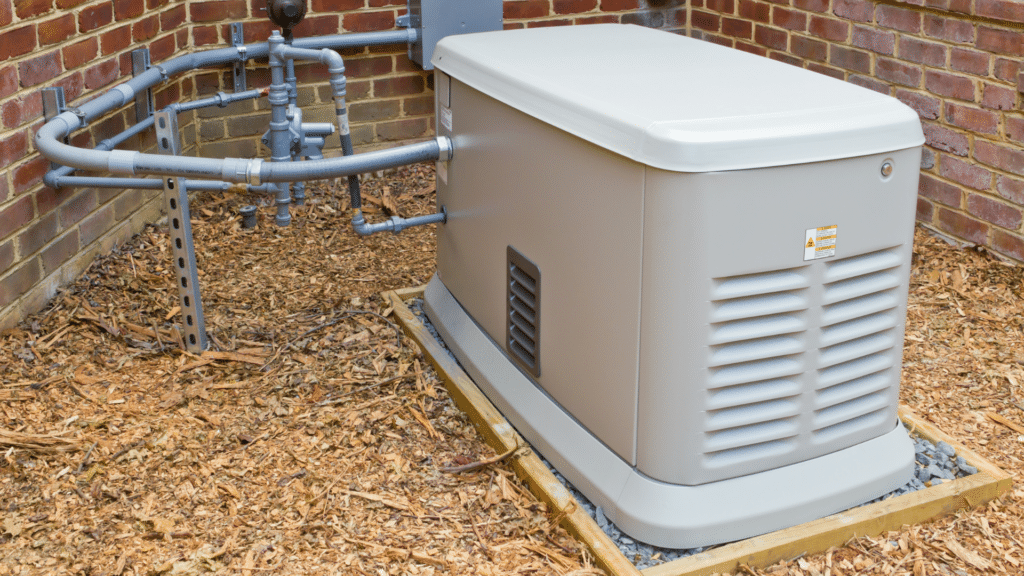Generators are one of the most essential appliances in your home. They provide you emergency power during times where your residential power may not be accessible, such as severe storms, sudden power outages, or temporary power line repairs. It is important to make sure your generator is perfectly functioning to prepare for these possible power outages. This means checking your unit every month or so even if you’re not using it to make sure it is functioning correctly. If your generator isn’t functioning as it should, you may need to look into having it repaired or replaced.

What are some signs your generator needs to be replaced or repaired?
If you notice visible damage to your generator
Although this may seem obvious, some homeowners may view visible damage as minor or just a cosmetic blemish when visible damage can be much more than that. Some important things to look out for that could impact how your generator is functioning is any loose wires or cables, or any wires that appear to be torn or damaged. Similarly, any large pieces of your generator that have been broken or fallen off may also be signs of more functional damage. When you see these signs of damage, it is important to inspect the situation further to see if the damage affected how your generator functions.
Your generator is producing inconsistent power
Sometimes your generator may be making power, but it might not be producing as much power as it is supposed to. This could look like temporary drops in your generator’s power, or only producing half its functional power output. These are all signs of internal damage. If you notice any of these issues with your generator you need to look further into the issue in order to fix your generator and have it produce power properly.
The generator delays when starting up
If you notice your generator doesn't start up right away or it takes a few times to get it started it may be an internal issue. Some reason this may be happening is your generator is running on old or bad fuel. This means the bad fuel gets logged into the tank or lines and gets stuck inside. If this is the case, your generators fuel filter needs to be replaced.
There is a strange smell or noise when your generator is running
If your generator is running and you all of a sudden notice an unfamiliar odor or noise, you should power your generator off as it could be dangerous. A bad smell could be a sign of a gas leak which is hazardous and could cause a health concern, Similarly, strange sounds such as buzzing or rattling are also signs your generator may be faulty. This could be caused by low fuel or an overworked unit. In any of these cases, it is important to get your generator inspected.
When should I repair my generator?

Service Hours:
If your generator is a fairly new model, it is likely any faulty signs are just minor issues. In this case, your generator would most likely just need a simple repair. There is no need to invest in a brand new unit if your generator needs a single simple repair.
Frequency of Repairs:
Similar, to how many service hours, if your generator doesn’t frequently need repairs there is no need to invest in a new unit. It is likely throughout the years your generator may need a repair here and there, but if it is overall high functioning and producing its full power output then you should continue with these small repairs rather than purchasing an entirely new system.
Age and Model:
Even if your generator may need more repairs than you would like, there are some cases in which it is better to repair your current generator rather than replacing the system. Some older houses or buildings are not equipped with the correct wiring to install a newer backup generator. If you wanted to get a new unit, this might mean changing all the wiring in your house and altering the structure of your home. This could be much pricier than expected. In these cases, it is smart to see if repairs to your current generator can be effectively done because it overall may be cheaper to do the repair than to alter your entire home.
Additionally, if you live in a new home and have a newer generator, you should always look into repairs first rather than replacing the system. If you have a brand new generator unit, any repairs are likely minor. These would be likely inexpensive to repair.
When should I replace my generator?

Service Hours:
Your generator’s reliability is related to the number of hours it has been running power throughout your house. If your generator is an older model from years ago, and you frequently use it to power your home, you may want to start looking into investing in a newer model. A newer unit from a reputable generator brand with fewer service hours will be much more efficient and functional in your home.
Frequency of Repairs:
If your generator is constantly needing repairs it may be time to look into replacing your unit. In most cases, generators with frequent repairs tend to be unreliable. Additionally, all of these repairs can be costly when added up. Rather than paying for a bunch of smaller repairs, you can use this money to invest in a new system that will be reliable to your home as well as much more cost-effective.
Age and Model:
As your home changes throughout the years and additional appliances get added to your home, your generator may struggle with producing enough power to use all of the new appliances in your house. If this is the case, a newer generator may be necessary to keep up with these modern demands. If your current unit is an older model, it may be a smart idea to look into updating the unit so you can power all of the appliances in your home when needed.
Additionally, older models of generators may be harder to repair. You may need a certain part in order to fix the unit that might not be made anymore. This would make finding that part extremely difficult or even impossible. In this case, a newer generator may be the best decision. Newer generators also tend to come with some sort of warranty, so if you did need to repair anything, you wouldn’t have to worry about finding a certain part or paying for repairs.
What is the price to repair a generator compared to the cost of a new unit?
The average cost to repair your generator is around $250+. If you have a smaller or portable generator it may be much cheaper to repair while if you have a larger backup generator it may be more expensive to repair. The cost of a repair also depends on what exactly needs to be repaired. If there are multiple faults, it will cost more to repair while if there is just a minor and simple repair it will be inexpensive.
The average cost to replace your whole house generator is around $8,000. For a whole house generator, this cost includes installation, labor, and electrical wiring.
Conclusion
If you are deciding between replacing or repairing your current generator, there are many factors to think about. First, you should consider your generator’s age and model. If it is older and tends to need many repairs, you may want to replace the entire unit to save money in the long run. If your generator is newer, repairing it may be the best option because it is likely to be a simple repair. Overall, consider all the factors mentioned above along with a professional generator expert’s opinion to make the best decision for your home.
